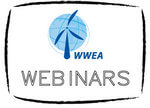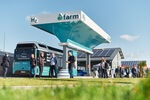News Release from Energy Watch Group (EWG)
Wind Industry Profile of
Key points of a legislative initiative for reliable and adequate renewable energy supply
On the occasion of this year’s 20th anniversary of the German Renewable Energy Sources Act (EEG), the Berlin-based Think-and-Do Tank Energy Watch Group (EWG) presents a legislative proposal to stimulate the system integration of renewable energy. The underlying purpose of the policy proposal is to allow renewable energy sources to finally assume responsibility for the system security of the power supply – i.e. to cover the required energy demand at every hour of the year. With a so-called combined power plant tariff, the instrument intends to stimulate investments for full demand coverage by 100% renewable energy. Based on own techno-economic cost estimates and a legal examination of EU regulations, the EWG proposes a fixed-feed-in-tariff of 8 cents/kWh, supported by a sliding market premium.
While renewables keep setting records in terms of their shares of national electricity mixes – Germany has recently hit the 50% mark –, a full transformation to an entirely renewable-based energy system is not yet widely regarded to be a tangible reality. One of the main reasons is the prevailing mistrust of the ability of renewables to provide year-round supply. Many scientific studies have already shown that a complete conversion to renewables is not only critical for reasons of climate protection, but also that it is technologically feasible (in combination with storage technologies and digital control technology) at any hour of the year and at cost-effective prices. What is still missing, however, is a legal basis to enable the market penetration of reliable and adequate 100% renewable energy systems.
“The newly proposed Sector Coupling and Innovation Act for Renewable Energy is intended to become a major impetus to overcome the current challenges of the coronavirus recession and the climate crisis. More than ever, it is necessary to find solutions that both stimulate the economy and protect our climate,” said Hans-Josef Fell, who, as President of the EWG and author of the draft law EEG 2000, was responsible for drafting the new legislative initiative.
Stefan Gsänger, Secretary General of the World Wind Energy Association, emphasized: “Renewable energy ultimately can, must and will assume responsibility for system security. Today, wind and solar power have become the cheapest forms of energy. As a next step, the investments in the optimised integration of all renewable energy sources must be massively increased. The EWG’s new policy proposal shows how this can be achieved effectively and deserves wide attention.”
The law would create a market for the very large number of start-ups and established companies that are in the starting blocks with innovative system developments for storage, digital controls, green power generation and sector coupling, but do not yet have a viable market environment to generate large-scale privately financed investments.
“The advantages of low, decentralised and transparent energy production costs can now be shared with those of climate protection and security of supply, especially since integration comes also from the regional level in support of the transmission network. Further innovations and growth markets can certainly develop if technologies such as batteries, hydrogen, heat pumps and heat storage in combination with solar and wind energy are dynamically developed towards decentral system responsibility.”, states Thure Traber, Chief Research Officer at the EWG and author of the legislative proposal.
A legal examination of the proposal has shown the compatibility with EU regulations. A distinction is made between a fixed feed-in tariff per kWh fed into the grid for small plants and a floating market premium for larger plants that participate in electricity competition via direct marketing. Similar options for policy implementation are expected at international level. With political majorities in national parliaments, the proposal can help to realise effective climate protection and, after the end of the coronavirus pandemic, a rapid recovery of the economy together with the phasing-out of fossil and nuclear energy in favour of clean renewable energy sources.
The full policy paper is available here.
- Source:
- Energy Watch Group
- Author:
- Press Office
- Link:
- energywatchgroup.org/...
- Keywords:
- EWG, sector coupling, key points, renwables, energy supply, EEG, legislative proposal, energy transition, WWEA, coronavirus, law
























